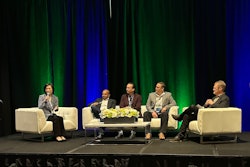This week’s CCJ Tech Shorts highlights a new logistics software solution that aims to simplify freight planning, a cold-chain collaboration that seeks to reduce food and pharma waste and more. CCJ Tech Shorts is a weekly roundup of technology in trucking.
Contents of this video
00:00 Tech Shorts intro
00:24 Planimatik logistics software
01:33 Real-time visibility and analytics solutions for the cold-chain
02:30 Last-mile delivery routing and dispatch solutions
03:08 Drowsiness Detection
00:00 This week’s CCJ Tech Shorts highlights a new logistics software solution that aims to simplify freight planning, a cold-chain collaboration that seeks to reduce food and pharma waste and more.
00:24 Cargobot, a Miami-based international digital freight company that connects shippers and carriers, has rolled out a new logistics software solution called Planimatik, an end-to-end transportation management system.
Developed as a software to simplify freight planning and logistics processes, Planimatik provides shippers with features to prioritize efficiency without changing current operations, providers or workflows.
As a brokerage/carrier-agnostic platform, shippers can utilize any provider they choose to procure freight, including but not limited to Planimatik Bid Marketplace, and integrate it into the Planimatik software. It is built to simplify onboarding and day-to-day operations with a user-friendly interface to enable shippers to streamline their logistics operations, such as full truckload data management, less-than-truckload rate access and procurement, carrier tracking and automated RFP processes.
Within eight weeks, Planimatik early adopter Texas Tissue experienced an increase in efficiencies to the tune of a 24% increase in budgetary savings, 60% less time spent quoting, and 52% faster access to load details.
01:33 A new collaboration is delivering real-time visibility and analytics solutions for the cold-chain industry on a global scale. Sensitech and Qualcomm Technologies Inc. have partnered to address the challenges experienced in the cold chain sector, which is often fragmented, with different providers and technologies at each stage, leading to limited visibility and significant risk. The end goal is to ensure that foods and medications reach their destinations safely and to help reduce food and pharma waste.
Near term, the focus will be on enhancing Sensitech’s real-time monitoring product suite by leveraging the Qualcomm Aware Platform for advanced global location precision and reliability. This includes the multi-modal flagship variant, TempTale GEO X, launched to monitor life sciences global cold chain shipments. This collaboration will also allow Sensitech to expand asset tracking capabilities by leveraging these technologies in Carrier’s Lynx ecosystem.
02:30 Nauto, a provider of AI-powered safety solutions for commercial vehicles, and Beans.ai, a technology firm specializing in AI-powered routing and dispatch solutions, have partnered to offer a solution tailored to the unique needs of commercial fleets engaged in last-mile delivery.
Combining Nauto's advanced AI-powered VEDR solution with Beans.ai's precision pick-up and drop-off location data and micro-routing expertise enhances the safety, efficiency and accuracy of last-mile delivery operations and makes VEDR compliance easy for package delivery contractors.
03:08 Samsara has launched its Drowsiness Detection feature into general availability for customers globally.
Drowsiness Detection uses Samsara’s comprehensive AI models – trained on its large-scale dataset – to proactively detect when signs of drowsiness occur. Then, it triggers real-time in-cab audio alerts for drivers, while notifying managers via text or email to triage fatigue-related events in the moment. These insights can be viewed as aggregated reports within the Samsara Platform, allowing managers to analyze patterns of fatigue across their fleet, focus on driver coaching, and ultimately reduce drowsy driving to improve road safety.
To ensure accuracy, Samsara’s comprehensive Drowsiness Detection is trained to consider several behaviors that indicate fatigue, in alignment with leading and clinically validated standards for defining drowsiness. These behaviors include head nodding, slouching, prolonged eye closure, yawning, rubbing eyes and more.










